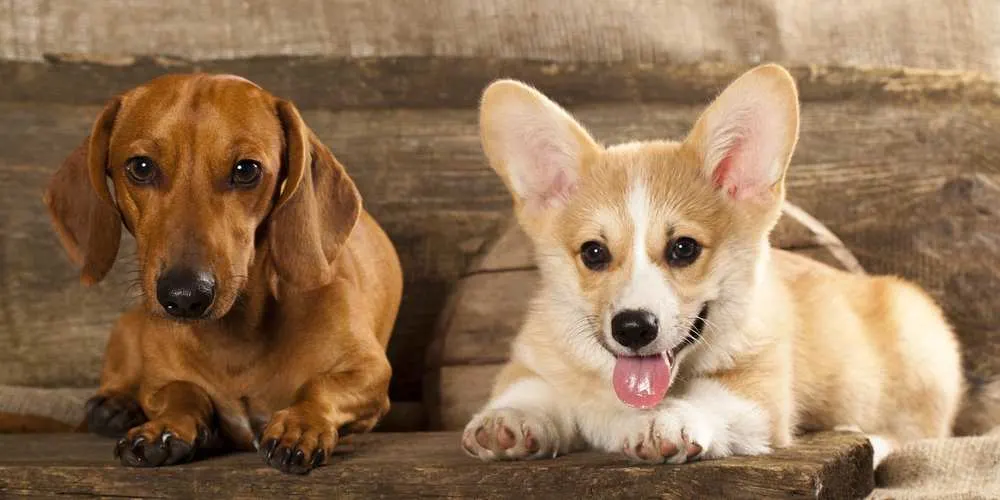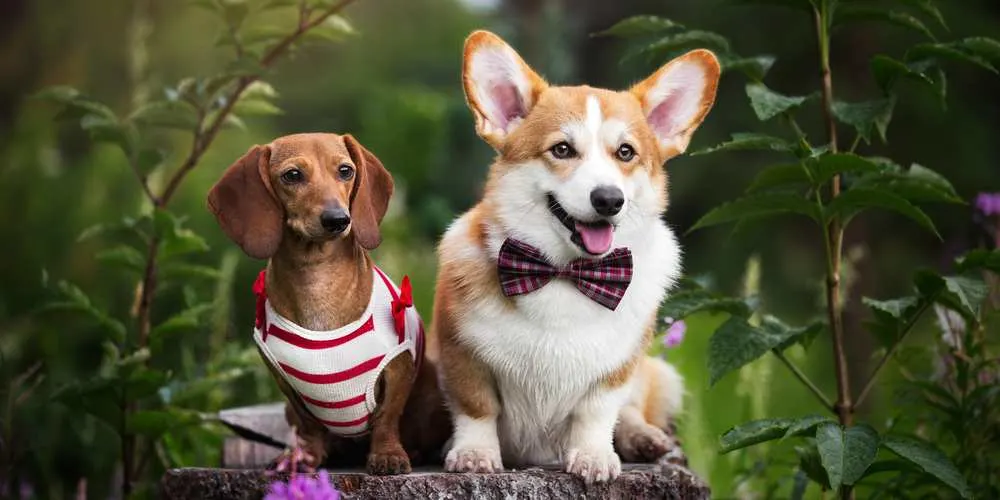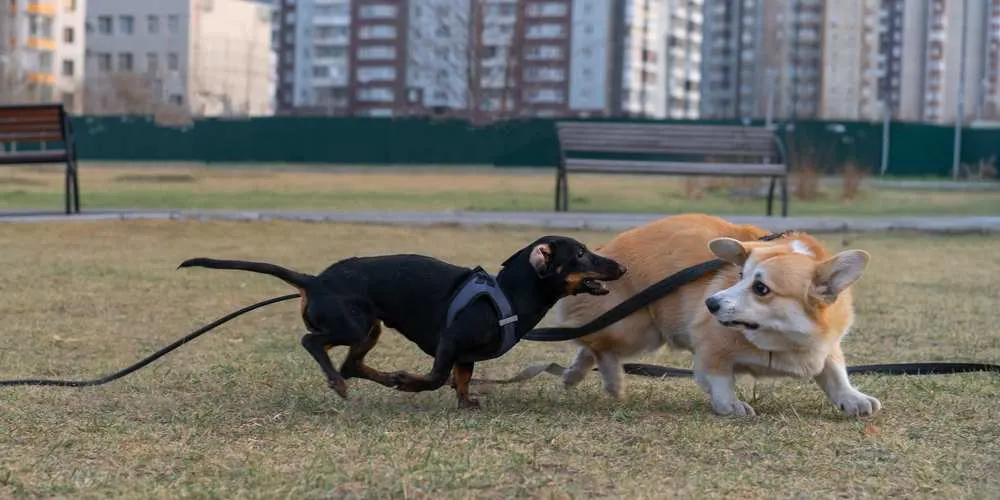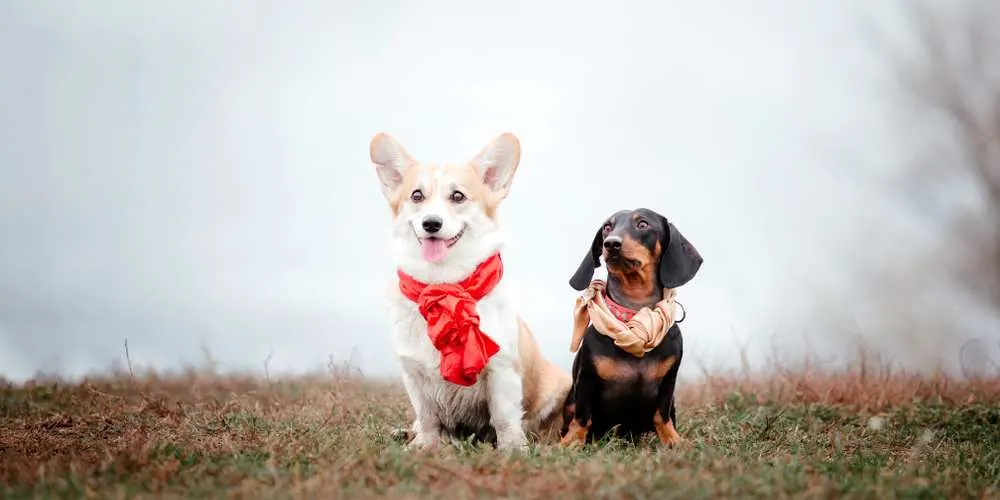If you are a proud owner of an affectionate Corgi, it is only logical that sooner or later, you will want to adopt one more puppy. Corgis tend to have such an influence on people.
You should not take that decision lightly, though. It is imperative to think things through and find a dog breed that gets along well with Corgis.
This article will help you by answering the question: Do Corgis get along with Dachshunds?
It is a complete breed compatibility guide that will also teach you everything you need to know about the key characteristics of both the Corgi & Dachshund breeds.

Key Characteristics Of Corgis
Before you even start considering getting one more dog of another breed, you have to make sure you are well acquainted with all about your Corgi. We can speak only of typical Corgi traits, but you also need to take into account how your pet behaves since that too will have a significant impact on choosing the best possible breed to adopt. After all, the temperament of your Corgi has been shaped by your raising and training, too.
We are sure that you have raised your Corgi well and you know everything there is about him or her. The personal traits are your business, but we know a thing or two about the typical Corgi traits that could cause some problems with a newcomer.
Here is a short insight that should help you, or any inexperienced Corgi owner, when choosing a sibling or a best friend for your pooch:
1. Corgis Are Highly Energetic Dogs
Corgis have a lot of energy, especially for such small dogs. They enjoy playing, running, jumping, wrestling with other dogs – they simply cannot stop! This can have a significant impact on a second dog you bring into your home. It can be either positive or negative, depending on the character of your new adoptee.
Corgis might seem like little fluff balls that you could cuddle with for hours, but they are not the kind of dogs that can lay on your couch for hours doing nothing. Some other breeds are, though, and if you were to get a dog like that, chances are your two pets will not “click.” Such a miss-match of energy will be hard to overcome.
While your Corgi will want to play with a new friend all the time, this other dog will most probably feel frustrated by your pet’s attempts to get him or her involved. Some dogs simply need their quiet time, and things can become nasty if they are deprived of it.
Therefore, it is best to find a dog with an energy level that matches that of your Corgi. The second dog should be as playful and fun-loving as your first one. Your new pet should also have the same roughhousing habits and be capable of holding its own to avoid being trounced upon all the time.
2. Corgis Have A Stubborn Streak
Even though Corgis are super-cute and easy-going most of the time, they can still stir up some trouble when they feel like it. They have a fair share of stubbornness that will undoubtedly surface from time to time – and then you’ll have a handful!
Perhaps you are the lucky owner, and your Corgi is not stubborn at all, but the majority of these short-legged dogs are. When you are looking to adopt, you have to be aware that many other breeds are like that as well. A wrong choice could inspire your Corgi to fight.
If you already have a stubborn Corgi you have to deal with, adopting another stubborn dog could be too much for you to handle. Instead of opting for double-trouble, you should best find a less stubborn breed. If you are lucky enough, your second dog can even have a positive influence on the hard-headed Corgi, which would be great for you and your dogs.
3. Corgis Have A Natural Instinct To Nip And Herd
Corgis love nipping. In fact, nipping and herding are written in your Corgi’s DNA – and this means there is nothing you can do to change it. When Corgis are pets, they do not have any cattle to herd, and that is why they switch their interest to humans or other dogs. It is some serious business.
You need to be extra careful when bringing a new dog into your home, especially if it is a young puppy. It is safe to assume that your Corgi will immediately try to take the role of a leader and start practicing his or her herding skills on the newcomer.
There are really slim chances that the above-mentioned scenario will not happen, so you should best be prepared for it. What can you do? You need to help the new pup by stepping in and correcting Corgi’s negative behavior as soon as you notice it. If you don’t, the puppy can become anxious and sacred or even get hurt.

Key Characteristics Of Dachshunds
Dachshunds are little charming dogs. Just like Corgis, they are lively and playful. They want to be in on everything and have a great sense of humor.
These loyal “wiener dogs” are devoted to their families and make excellent house dogs. Before you decide if a Dachshund can become a member of your family, let’s see what temperament traits can cause a potential problem:
1. Dachshunds Can Be Jealous And Possessive
Even though Dachshunds are usually good with other family dogs, they want a lot of your attention and can cause problems when they think they are not getting enough of it. Besides, these short-legged dogs get attached to their toys too and can be very possessive of.
It would be best if you acted as soon as you noticed the first signs of either negative behavior. Both jealousy and possessiveness can cause a clash between your Corgi and Dachshund. Act before these turn into bad habits!
Start by making sure both of your dogs get enough of your attention, and then teach them to share their toys and play together.
2. Dachshunds Are Chasers
Dachshunds need their long daily walks, just like Corgis. They like to run and play and need plenty of exercises. In fact, they enjoy running a bit too much. Chasing and hunting is their natural instinct – so be careful around chipmunks & birds.
Many Dachshund owners have had a problem with a runaway dog. Dachshunds are quick and agile chasers that have a tendency to take off! This can be a severe problem when you have two dogs off the leash and cannot leave one behind to go chasing for another. Thus, it would be best to keep your Dachshund on the leash until you are 100% sure he or she is appropriately trained.
Typically, larger Standard Dachshunds are less active and mischievous than Miniature Dachshunds. Wirehaired Dachshunds are usually the most energetic ones, while Longhaired Dachshunds are often very quiet and sweet-natured. Of course, these are only generalities!
3. Dachshunds Prefer Doing Things Their Own Way
Dachshunds are very clever dogs, and they know it! These proud little dogs will try to do things their own way whenever possible. In short – they are stubborn! So, what can you do?
First of all, begin asserting yourself as a leader at their early age. Start the training as soon as you bring your puppy home and be tenacious and consistent. Do not use force – it will make things even worse.
Dachshunds will resist force and probably become even more stubborn or even aggressive. If you push them too far, they will defend themselves by growling or even snapping at you. So remember this: no jerking, teasing, or treating your dog harshly!
The best training method for proud and hard-headed Dachshunds is rewarding their positive behavior. Praise them cheerfully or offer them treats whenever they are good and obedient, and, in time, they will learn to act that way all the time.

Are Corgis And Dachshunds Compatible?
Corgis and Dachshunds are quite similar dogs. They are both small, short-legged dogs suitable for home pets. Both these breeds are working dogs with a lot of energy and a desire to play & run. Their energy levels are pretty much the same, which is a good thing.
Dachshunds are easy-going and friendly as much as Corgis. They are not overly aggressive or territorial either. The two should get along just fine, especially if you prevent some of the potential problems.
What Are The Potential Problems When Corgi And Dachshund Pair Up?
Unfortunately, both dogs have a stubborn streak. They can pair up and become big troublemakers you will have a hard time handling. It would be best to get the second dog only when you are 100% sure you have resolved the stubbornness issues with the first one.
Besides, Dachshunds are notorious for their housebreaking difficulties. Avoid having to housebreak both dogs at the same time!
The other potential issue you might face if you pair up a Corgi and a Dachshund is excessive barking. Both breeds are alert watchdogs and may act suspiciously towards strangers and other dogs, especially if not socialized properly. The reason behind excessive barking can be loneliness as well. So, make sure your dogs get enough of your attention and are not left alone at home too often.
If you do not deal with this issue, prepare yourself for a duet of sharp and persistent barking. Even if you do not mind, your neighbors will surely find it problematic!
What About Their Health And Grooming?
Both Corgis and Dachshund have a potential for serious spinal problems that can even result in paralysis, so you need to be aware of that and consider if you can handle two dogs with such issues at their old age.
Corgis and Dachshunds both have long bodies and short legs, which puts a lot of stress on their spine. Over the years, as this pressure accumulates, both breeds can develop painful disabilities, particularly herniated discs.
When it comes to grooming, Corgis shed much more than Dachshunds, which is a good thing since there will be less free hair for you to clean.

Final Words
Do not get caught up in trying to find a perfect match for your Corgi! It is almost impossible to predict all the potential issues, and no one can guarantee that you won’t have to face a few stumbling stones down the road.
If you monitor and nurture the relationship between your first dog and the newcomer, chances are the two of them will get along well no matter what breed they are. Finding a compatible dog breed will only make things a bit easier for you.
So, if you want to spare yourself some trouble, it is good to know that the members of the Dachshund breed work perfectly with your Corgi. Adopting a “wiener” dog will be a good starting point for building a healthy and happy, life-long relationship between your pets. Invest the right amount of time and care, and success is guaranteed!
Learn More:

